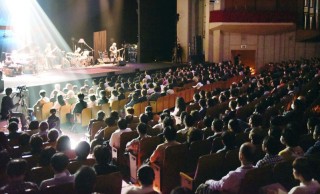Loading
Search
▼ Concert Ticket Resale Market Growing Fast
- Category:Event
By Mamoru Kurihara / Yomiuri Shimbun Staff Writer
The “secondary distribution” market for reselling concert tickets has been expanding rapidly, bolstered by the proliferation of intermediary services that sell the tickets online. There are merits to being able to sell unneeded tickets to people who want them, but resale-aimed buyouts have been driving up prices. Concert organizers are working to resolve the issue.
Internet-based intermediary sites are selling concert tickets for popular acts at high prices. Concert tickets for U.S. pop star Madonna, regularly priced at ¥50,000, for example, sell online for ¥210,000. Tickets to see the famous rock band GLAY that normally go for ¥7,560 are sold for ¥31,000.
According to Hunza, Inc., which operates the intermediary service TicketCamp, the domestic secondary distribution market rose to about ¥50 billion in 2015, and is expected to jump 60 percent to ¥80 billion in 2019. The expansion of the market is being driven by various companies’ bolstering of intermediary services.
In 2014, major U.S. e-commerce site eBay invested in TicketStreet Inc., which operates an intermediary site. Mixi Inc., a major membership-based social networking site, purchased Hunza in 2015. TicketCamp’s monthly turnover for December 2015 reached about ¥3.6 billion — a fourfold increase on a year-on-year basis.
In many instances, concert tickets are nonrefundable. People who become unable to attend, or were able to secure better seats, use intermediary services to resell their unneeded tickets online. However, there have been quite a few cases in which tickets are bought out specifically for the purpose of profiting through resale.
For some concerts, about one-third of tickets are bought out for resale purposes, according to the All Japan Concert & Live Entertainment Promoters Conference (ACPC), which is composed of major companies that plan and organize concerts. There have even been cases in which tickets for popular acts were resold at more than 10 times the regular price.
As sales of CDs remain stagnant, concert revenue has become a powerful source of earnings for the music industry. If buyouts for resale purposes become more widespread, prices will soar and fans will have greater difficulty seeing their favorite acts. The ACPC objects to such practices, saying the trust of fans will likely be lost if tickets are resold at unfairly high prices.
Steps being taken
Many local government regulations prohibit purchases for resale purposes. In one case, a man was arrested for buying tickets with the intention of reselling them online.
But Makoto Tanihara, a lawyer knowledgeable about the resale issue, said: “These regulations are meant to crack down on scalpers who resell tickets around concert venues, and were not created with individuals who sell them over the Internet in mind. Proving whether tickets were bought for resale is not easy, and it is no simple task to crack down through these regulations.”
Organizers have introduced such countermeasures as limiting ticket sales per person. It is difficult, however, to prevent resellers from making large purchases under multiple names. Efforts have also begun to cross-check the names of attendees against the name on their tickets, but this requires time and money.
Yahoo defended companies that mediate resales, saying they are good places for unneeded tickets to be matched with people who want them.
If an individual sells tickets in bulk on Hunza’s TicketCamp, the company asks why they are doing so. If it is judged to be for resale, measures will be taken, such as suspending the seller’s trading qualifications.
But if the seller says their tickets were not originally purchased for resale purposes, it is difficult to pursue the matter any further.
The ACPC and the Federation of Music Producers Japan have begun discussing measures against unlawful resales. They intend to call for a dialogue with the companies that operate ticket trading sites, aimed at the formation of a sound market. Some experts have said laws should be enacted to crack down on Internet-based scalper activity.
- February 24, 2016
- Comment (0)
- Trackback(0)


